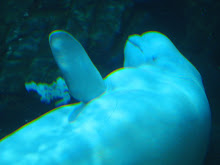I tried a new approach this time-find a source I'd like to cite and see what it tells me about Disney. So I found a few sources, and what I got out of them was this: Disney was able to make just what it wanted at one point, but now it is like Mc Donald's responding to carb crunch and making a salad. Disney is now accountable to the public.
So here's a new idea that will probably be discarded by me before the end of this blog:
The commercial success of Disney has made it more dependant on the likes and dislikes of the public, not the other way around. Ooh, I can even tie Pixar into it. When it first started out, no one really knew what it was, so no one cared. Now that it is wildly successful, the public is telling it what to make. Like sequels. Instead of a window to the future, Disney has become a magic mirror, only capable of reflecting, and slightyl jazzing up, the real world.
A good source for me to rhetorically analyze is this commentary by K. Marling. It argues what I am now (yes, just for now, since I will probably not stick to it, but you never know...) thinking, that Disney is merely following what it sees in society.
The article is pretty sticky, starting out with an anecdote, and not fully giving away its position until readers are hooked. The author actually starts out by arguing the opposite side of the argument than what the paper tries to prove is correct. This is a good way to get the proper audience to read the rest of the article. It starts out with very familiar images, then gives a few unexpected twists to interest people. However, it does get technical and detailed in the middle, where it is most dangerous. Readers, like myself, are liable to get over our first interest and then despair when we see that we are nowhere near the end. We can just barely hang on with the help of her chronological arrangement, and her very logical argument. A is followed by B in a clear manner that won't confuse anyone. The work cites very familiar Disney movies to prove its points, which is something I want to do in my paper.
In fact, this paper is a lot like something that I could write and turn in for this class. It has some ideas about stickiness and the rhetorical situation, though it is not perfect. It is comforting to know that not even professors know how to write the perfect persuasive paper.
Subscribe to:
Post Comments (Atom)
.png)
.png)

No comments:
Post a Comment